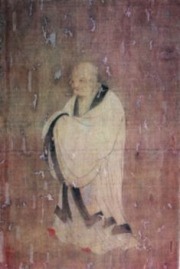Despite being the author of one of the wisest books in human history, very little is known about Lao Tzu. Originally named Li Er (李耳) and Dan (聃), Lao Tzu is believed to have written only one book – Tao Te Ching. However, this book is so profound that it has earned him a place among the world’s most respected philosophers.
The wisdom found in Tao Te Ching has never failed to inspire and has garnered praise from people far and wide, including some of the greatest minds in history. Lao Tzu lived approximately 2,500 years ago during the Warring States Period in ancient China, a time of great cultural and intellectual vibrancy.
Legend has it that Lao Tzu worked as a keeper of an imperial archive, granting him access to books that were rare during his lifetime. According to folklore, Lao Tzu was not born as a baby but rather as a 62-year-old man with a beard and long earlobes. It is said that his mother conceived him after gazing upon a falling star, resulting in an unusually long gestation period.
Despite being one of the greatest thinkers in Chinese history, Lao Tzu had not documented his thoughts in writing until he was asked to do so by the warden of the western border gate. As he was about to retreat from the tumultuous state, the warden recognized him and convinced him to write a book for future generations. Lao Tzu agreed, and thus the 81 verses known as Tao Te Ching came into existence.
Tao Te Ching has since become the primary scripture of Taoism, and Lao Tzu is revered as its founder. It is believed that Lao Tzu was older than Confucius, and when the two men met, Confucius was so awestruck by Lao Tzu’s wisdom that he later said to his disciples, “In him I saw the dragon riding on the clouds.”
Lao Tzu’s name, when translated, means “old learned gentleman” and is pronounced as “lao zi.” He is more commonly known as Laozi in China, but in the West, his name is often translated differently, such as Lao Tse.
Find out more about Lao-tzu and Tao Te Ching
Go to home page

